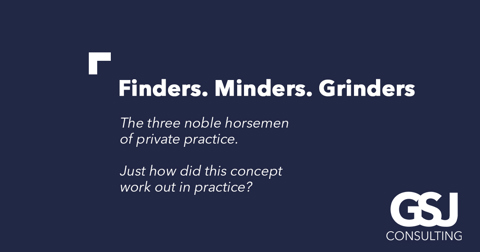The three noble horsemen of private practice: ‘finders, minders and grinders’

When I first started working in private practice back in the mid-1990s, there were what was then commonly known as the Three Noble Horsemen of private practice: ‘The Finders, The Minders and The Grinders’.
‘The finders’
These were what we today call ‘rainmakers’.
They went to all the conferences. They were members of the most exclusive golf clubs. They spent hours at some of the finest gyms and clubs. Indeed, there isn’t anywhere they wouldn’t go – often at short notice – if they thought their next big deal was there.
‘The minders’
These were the people charged with looking after the client once the finders had brought them in.
They were good professionals, and they had some great networking skills, but they weren’t very good at sourcing greenfield opportunities. To that end, they went to conferences and played golf, so long as their prized client was at the conference or playing golf that day.
Today this group are more commonly known as ‘Client Relationship Partners’.
‘The grinders’
These were academically brilliant professionals who gave spot-on advice. They were the product that the finders could sell and the bedrock that the minders could rely on.
Mostly introverted and shy, however, they neither liked the idea of ‘selling’ themselves nor the thought that they would have to network with clients. They just wanted to be on the tools – good at the profession of the profession, but not good at the business of the profession.
And, in those days, most professional firms knew, accepted, and encouraged that if the business was going to succeed, it needed all these skillsets. To have finders without minders and grinders was a quick route to failure. As was having grinders without minders and finders.
They were all interwoven.
Introducing the balance scorecard
And then, we introduced the ‘balance scorecard’.
Under the balanced scorecard, to maximise your remuneration, all you need to be able to do is show that you are a little of everything – but expert at nothing.
Finders needed to do some minding and, heaven forbid, grinding.
Minders now needed to do some finding and grinding.
And, worst of all, those introverted grinders now needed to do some finding and minding.
So how did this work out?
The grinders were on the way out
Unsurprisingly, after a short period of time, the grinders were on their way out. It was just too hard for them to find work and even if they did fluke a new matter, they simply couldn’t keep the client past one or two deals. So, on the basis that “if you cannot beat them, join them” many of the grinders decided to join the growing ranks of in-house counsel.
The finders were in a spot of trouble
More surprisingly, the finders found themselves in a spot of trouble. They were a heavy cost, and under the new performance structure, they weren’t making any money/profit. Sure, they may get the odd referral credit, but they weren’t really doing any of the work, and so – in truth – anyone could do what they were doing.
The minders did the best, but…
Out of all of them, the minders were doing the best. But without the finders to help them find the work and the grinders to actually do the work, the minders soon become what we like to call ‘entrepreneurial’ partners.
And so that is where we are today.
But I do miss the days of the Three Noble Horsemen of private practice: the finders, the minders and the grinders, and I think any firm looking at its 2025 and beyond strategy could do a lot worse than to get a hell of a lot better at its finding and grinding, even if that comes at the cost of some minding.
Contact GSJ Consulting
We can help you Aquire, Retain, Grow
The information contained in this article is of general nature and should not be construed as professional advice. If you require further information, advice or assistance for your specific circumstances, please contact us.
